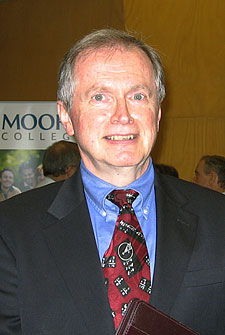World-renowned theologian Dr Don Carson delivered a challenging talk on the nature of church and state at the Moore Partners annual dinner last night.
The Trinity Evangelical Divinity School New Testament professor spoke to a capacity Broughton Knox lecture theatre and two overflow rooms at the post-dinner open lecture and warned those present about the danger of proof texting to justify their view on the interaction of church and state.
 Dr Carson also stressed that Christians must never neglect the gospel as the primary area of sharing compassion with others.
Dr Carson also stressed that Christians must never neglect the gospel as the primary area of sharing compassion with others.
"It's a great mistake to think you can be truly compassionate if you have only done temporary relief," Dr Carson says.
"If the gospel is not the primary focus in our compassion we could become a generation who will be compassionate without the gospel."
The dinnertime discussion between Moore senior research fellow Dr Peter O’Brien and Dr Carson gave the visiting theologian and author an opportunity to talk about two of his writing projects.
Firstly, Dr Carson spoke about his latest book Memoirs of an Ordinary Pastor: The Life and Reflections of Tom Carson, which is an account of the life of Dr Carson's father who was a pioneering church-planter in Quebec and remained a regular, faithful Baptist minister.
Dr Carson also spoke about an online community he has helped form in partnership with Redeemer Presbyterian senior pastor Dr Tim Keller called The Gospel Coalition.
The Gospel Coalition is a fellowship of evangelical churches committed to renewing Christian faith in the gospel of Christ and reforming ministry practices to conform fully to the Scriptures.
Prior to Dr Carson's dinner address Moore college academic dean Dr Mark Thompson addressed current issues in the global Anglican Church, including the tensions between liberals and evangelicals and the significance of June's GAFCON meeting.
New image for Moore's friends
Rector of St Thomas’, North Sydney, the Rev Simon Manchester says the name Moore Partners has replaced Moore Alumni as it better describes the work of the group.
"We thought "alumni' didn't explain very much and had more of an American feel," he says.
"We wanted a name that indicated there was a wide fellowship of Moore grads and supporters. We wanted to show that we are more than a fellowship " we're a partnership."
The Moore Partners committee has also expanded to be more inclusive of a wider range of people.
"The committee has expanded from three or four to eight or ten with representatives including graduates from the 70s, 80s, 90s and 2000s," Mr Manchester says.
"This is a way of strengthening the bonds between the College and the people who are linked to it as supporters and through training there."



















